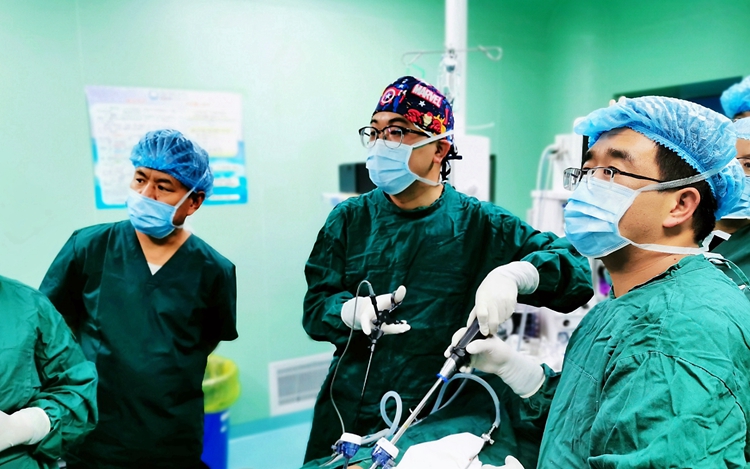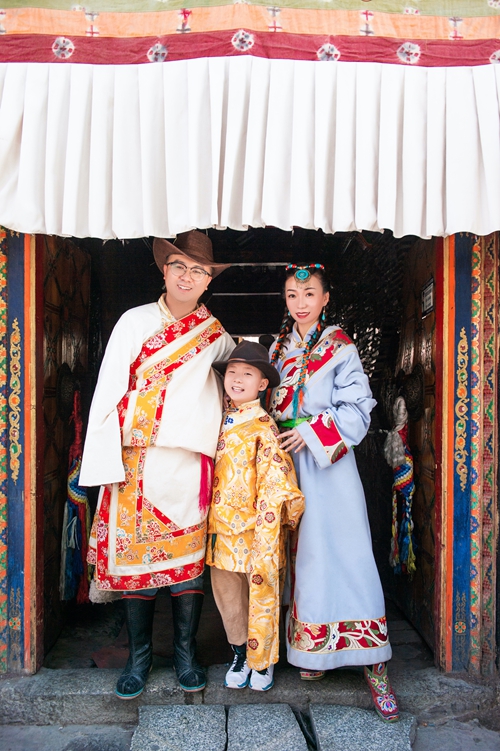yue mengchen, the son of a doctor, refused to hand in his father’s day homework because it was not a poster with the latest photo starring him being with his father, as required, but a photoshopped image showing them together. the 7-year-old burst into tears and said, “it's different. when will daddy be home?”
his father, yue fei, is a deputy chief surgeon from shanghai-based ruijin hospital. he volunteered to serve at the xigaze people’s hospital, in the tibet autonomous region, for three years as part of a medical partnership assistance program to help the region grow. xigaze, situated at the foot of mount qomolangma, is 4,215 km away from home.
the boy didn't know that his father is working on the plateau to help consolidate the poverty alleviation results. tibet had already shaken off extreme poverty by the end of 2019, yet, “families who have just risen above the poverty line are more likely to slip back into poverty because of illness,” yue fei said.

yue fei (center) conducts minimally invasive surgery at the xigaze people's hospital in tibet autonomous region on march 26, 2021 (courtesy photo)
doctor braids
since the 1990s, medical workers from renowned hospitals across the nation have been signed up to work in tibet to accelerate the development of medical and health services in the region. since shanghai teamed up with xigaze, the second largest city in the region, doctors from the metropolis have taken turns to work in xigaze for stints of one or three years.
yue fei is one of them. his tenure lasts from july 2019 to july 2022, during which he acts as both a leading surgeon and vice president of xigaze people's hospital in charge of training, advanced technology application and staff performance assessment.
xigaze is a city with an average altitude of 4,000 meters. the lack of oxygen poses a challenge to yue fei and his colleagues. “when we climb up a flight of stairs or walk a little faster, the heart beats faster too, like it does on a first date,” he said, adding that it is hypoxia that makes the heartbeat accelerate.
what’s worse, hypoxia makes surgery in xigaza much more energy consuming than in shanghai. “we are called doctor braids because when we do surgery, both the patient and the surgeon are on oxygen. without additional oxygen, our brains can become slow at critical times,” yue fei said.
although occupied by a load of administrative work as a vice president of the hospital, yue fei loves being in surgery. “i always keep my surgical cap on my desk because i might be needed for an emergency operation at any time,” he said. after coming to tibet, he has saved more than 100 lives in emergency surgeries.
saving lives aside, training young tibetan doctors features high on yue fei’s agenda. before 2019, local surgeons in xigaze people’s hospital could only conduct laparoscopic or “minimally invasive” surgery on the gall bladder. today, two of yue fei’s students have mastered the technique for gastrointestinal and liver surgeries. “i hope that after three years, local doctors in tibet can conduct complicated surgeries and manage the more difficult cases just like their counterparts in shanghai can,” he said.

yue fei and his family in lhasa on august 4, 2020 (courtesy photo)
smarter medical care
it was a september afternoon in 2020. a patient named padma showed up at the emergency ward of gyangze county people’s hospital, 91 km southeast of xigaze. he had been coughing and experiencing bouts of cold sweats for two days. an electrocardiogram (ekg) was done and the image was sent to xigaza people’s hospital via an ekg cloud system in real time. “it’s an acute myocardial infarction,” peng wenhui, a doctor in xigaze diagnosed. peng is a cardiologist from shanghai tenth people’s hospital. he came to work in the plateau for one year. after consulting with multiple cardiologists, a green channel was opened to transfer the patient to xigaza for surgery. two hours later, the patient’s life was no longer on the line.
according to yue fei, besides three leading experts whose tenure is three years, shanghai sends a 20-member-strong medical team to xigaze people’s hospital every year to assist in local development. for the 10 key departments, such as general surgery, experts are sent to offer their medical services on an annual basis. for smaller departments or critically ill patients, doctors in shanghai will assist via the remote consultation system. robots and cloud computing applications are used by the hospital to connect doctors and patients in shanghai and xigaze.
yue fei and his team, as of 2020, had built an assortment of cloud data banks, which stores all medical images of the xigaze people’s hospital and all electrocardiographs of five county-level hospitals in the city. the ekg cloud system is one of the data banks. doctors in shanghai, xigaze and five counties including gyangze can access the data banks via cellphones and tablets and make a diagnosis as soon as possible.
in addition, since 2018, patients and doctors in xigaze alike can video-chat with doctors in shanghai via a robot system, and their medical history can be shared in real time. tashi chozin, a pediatrician at xigaze people’s hospital, is a beneficiary of the system. when she has a problematic case or critically ill patient, she will contact the shanghai team in real time. most of them have worked in xigaze for some time. “thanks to the introduction of the robot system, doctors in shanghai can now answer our questions and teach us directly. it’s very convenient for all of us tibetan doctors and patients,” she told beijing review.
"without leaving xigaze, patients can receive the best medical treatment from shanghai. not everyone can afford to get on a flight. besides, some patients are too ill to endure the long journey," yue fei said.
an absent father
working on the plateau does come with another “side effect” for yue fei—he has become more emotional when thinking about his son, he said. he was a strict father, who would discipline his son and seldom show any emotion at home. “my boy was kind of afraid of me,” the 40-year-old said.
when yue fei left shanghai, his son had just finished kindergarten. “he will be a fourth grader when my tenure finishes. at the most critical stage in a boy’s formation, yet i, as a father, cannot be there with him,” yue fei explained.
in the first few months following his father’s departure to tibet, the little boy tended to wake up in the middle of the night and cry. his dad would then video call him to comfort the young broken heart.
“my son couldn’t understand why i left for tibet,” yue fei said. he tried to explain it to him in the simplest way possible. he told the boy that patients in tibet before had to get big incisions when undergoing surgery. now, with doctors who can do minimally invasive surgery all the way from shanghai, they just need to get a few tiny holes, and can be on their way home again the next day. “isn’t that a wonderful thing?” yue fei asked his son. the boy nodded.
however, when his first father’s day being apart from his father came around on june 21, 2020, the young boy’s tears welled up again. it was days after the galwan valley clash between china and india in mid-june 2020. yue fei asked his son, “if our soldiers are injured, who can help them?” he then continued, “working in tibet, dad is not only a doctor, but also a soldier, a soldier wearing a white coat instead camouflage.”
the boy understood. when he visited his father in xigaze in august 2020 for seven days, his father was busy for half of the week he was there. the boy declined an invitation to a two-day tour around nearby scenic spots. instead, he stayed in his father’s dormitory, killing time by reading. why? “if i were to go sightseeing, i would not be able to be with my dad for days,” the boy said. yue fei’s heart melted upon hearing his son utter those words.
"our emotional bond is now stronger than ever,”"he concluded.
